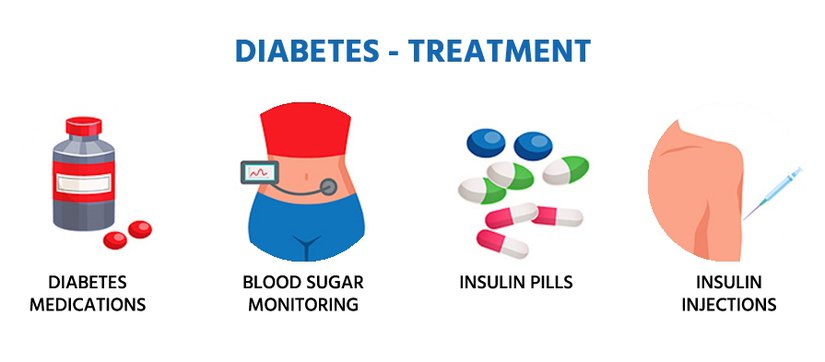TOP 5 health problems and treatments

List of TOP 5 health problems are:
- heart problems
- cancer
- diabetes
- mental health disorders
- COPD
Short description
- Heart problems is a leading cause of death worldwide and is characterized by the build-up of plaque in the arteries, which can lead to heart attacks and strokes. Treatment options include lifestyle changes such as a healthy diet and exercise, as well as medications such as statins and blood pressure drugs.
- Cancer is a group of diseases characterized by the uncontrolled growth and spread of abnormal cells. Treatment options vary depending on the type and stage of cancer, but may include chemotherapy, radiation therapy, surgery, and targeted therapies.
- Diabetes is a chronic condition characterized by high levels of sugar (glucose) in the blood. It is typically treated with a combination of lifestyle changes such as diet and exercise, as well as medications such as insulin or oral glucose-lowering drugs.
- Mental health disorders such as depression, anxiety, and bipolar disorder are common and can have a significant impact on quality of life. Treatment options include therapy, such as cognitive-behavioral therapy and mindfulness-based therapy, as well as medications such as antidepressants and anti-anxiety drugs.
- Chronic obstructive pulmonary disease (COPD) is a group of lung conditions that cause breathing difficulties. Treatment options include quitting smoking, using inhalers to open the airways, and oxygen therapy.
Statistics for each problem
- Heart disease is a leading cause of death globally, accounting for 17.9 million deaths per year. It includes conditions such as coronary artery disease, heart failure, and arrhythmias. Treatment may involve lifestyle changes, such as a healthy diet and regular exercise, as well as medications and medical procedures.
- Cancer is the second leading cause of death globally, with an estimated 9.6 million deaths per year. It is a group of diseases characterized by the uncontrolled growth and spread of abnormal cells. Treatment may include surgery, chemotherapy, radiation therapy, and targeted therapies.
- Diabetes is a chronic condition that affects the way the body processes sugar. It is estimated to affect 422 million people worldwide, and can lead to serious health complications such as heart disease, blindness, and kidney failure. Treatment may include lifestyle changes, medications, and insulin therapy.
- Mental health disorders, including depression, anxiety, and schizophrenia, affect an estimated 446 million people worldwide. Treatment may involve therapy, medications, and support from friends and family.
- Chronic obstructive pulmonary disease (COPD) is a group of lung conditions that block airflow and make it difficult to breathe. It is estimated to affect 329 million people worldwide and is often caused by smoking. Treatment may involve quitting smoking, taking medications, and using oxygen therapy.
Treatments for heart problems
There are several types of doctors who can treat heart diseases, depending on the specific condition and its severity. Some of the doctors who may be involved in the treatment of heart disease include:
- Cardiologists: These are doctors who specialize in the diagnosis and treatment of heart diseases. They may be involved in managing medications, performing diagnostic tests, and recommending lifestyle changes to help manage heart disease.
- Cardiac surgeons: These doctors perform surgical procedures to treat heart diseases, such as coronary artery bypass surgery or valve repair surgery.
- Primary care doctors: These doctors, such as family doctors or internists, may be the first point of contact for patients with heart disease. They can manage medications, refer patients to specialists, and provide ongoing care for patients with heart disease.
- Other specialists: Depending on the specific condition, patients with heart disease may also be treated by other specialists such as electrophysiologists (doctors who specialize in the heart’s electrical system) or interventional cardiologists (doctors who specialize in minimally invasive procedures to treat heart disease).
There are various treatments for heart diseases, which include lifestyle changes, medications, and medical procedures.
Lifestyle changes needed:
- Eating a healthy diet that is low in salt, fat, and cholesterol
- Exercising regularly
- Quitting smoking
- Limiting alcohol intake
Medications:
- Blood pressure medications to lower blood pressure
- Cholesterol-lowering medications to reduce cholesterol levels
- Aspirin to prevent blood clots
- Heart failure medications to improve the function of the heart
Medical procedures:
- Angioplasty and stenting to open blocked arteries
- Coronary artery bypass surgery to bypass blocked arteries
- Heart valve surgery to repair or replace damaged valves
- Pacemaker or defibrillator implantation to regulate heart rhythm
It is important to work closely with a healthcare provider to determine the most appropriate treatment plan for an individual’s specific heart disease.
Treatments for cancer
There are several different treatments for cancer, and the best course of treatment will depend on the type and stage of cancer, as well as the patient’s overall health. Some common treatments for cancer include:
- chemotherapy,
- radiation therapy,
- surgery,
- targeted therapy,
- immunotherapy.
In some cases, a combination of these treatments may be used. It is important to discuss all treatment options with a healthcare provider, as well as their potential benefits and risks.
Oncologists are doctors who specialize in treating cancer. They may use a variety of treatments, such as listed above. The specific treatment used will depend on the type and stage of cancer, as well as the patient’s overall health.

Treatments for diabetes
Several treatments for diabetes are available, including:
- Medications: There are several medications available to help control blood sugar levels in people with diabetes. These include insulin, oral medications, and injectable medications.
- Lifestyle changes: Making healthy lifestyle changes, such as eating a balanced diet and getting regular physical activity, can help control blood sugar levels and manage diabetes.
- Insulin therapy: People with type 1 diabetes or some people with type 2 diabetes may need insulin therapy to help control their blood sugar levels. This can be done through injections or an insulin pump.
- Continuous glucose monitoring: This involves wearing a small device that continuously measures blood sugar levels and sends the information to a device that the person can read.
- Bariatric surgery: In some cases, people with type 2 diabetes may be candidates for bariatric surgery, which can help to control blood sugar levels and may even lead to diabetes remission.
- Other therapies: Other therapies that may be used to treat diabetes include kidney dialysis, nerve and vascular treatments, and wound care.
Treatments for mental health disorders
Popular treatments for mental health disorders, include:
- Psychotherapy: This is a form of talk therapy that helps individuals understand and work through their thoughts, feelings, and behaviors. There are many different types of psychotherapy, including cognitive-behavioral therapy (CBT), dialectical behavior therapy (DBT), and interpersonal therapy (IPT).
- Medications: There are many different types of medications that can be used to treat mental health disorders, including antidepressants, antipsychotics, and anxiolytics. These medications work by balancing chemicals in the brain that are involved in mood, anxiety, and other mental health symptoms.
- Self-care: This can include activities such as exercise, mindfulness, and getting enough sleep, which can help improve mental health.
- Support groups: Joining a support group can provide a sense of community and a place to share experiences and strategies for managing mental health disorders.
- Lifestyle changes: Making changes to your diet, exercise, and stress management can also help improve mental health.
Mental health disorders are typically treated by mental health professionals such as psychiatrists, psychologists, and therapists. It is generally recommended to seek help from a psychiatrist if you are experiencing symptoms that are affecting your daily life, such as difficulty functioning at work or school, problems with relationships or social interactions, or persistent feelings of sadness, hopelessness, or anxiety.
If you have thoughts of self-harm or suicide, it is important to seek help immediately. You can also consider seeking help from a psychiatrist if you have tried other forms of treatment, such as therapy or medication, and have not experienced relief from your symptoms. It is important to remember that seeking help for a mental health issue is a sign of strength and is not a sign of weakness. The specific treatment plan for a mental health disorder will depend on the individual and their specific needs and preferences. It is recommended to work closely with a mental health professional to determine the best course of treatment.
TOP
There are several options for COPD, including medications, lifestyle changes, and procedures.
Medications:
- Bronchodilators: These are medications that help to relax the muscles around the airways, making it easier to breathe. They come in the form of inhalers or tablets.
- Corticosteroids: These medications reduce inflammation in the airways and can be taken as inhalers or tablets.
- Antibiotics: These may be prescribed if the COPD is caused by a bacterial infection.
- Oxygen therapy: If the COPD is severe, oxygen therapy may be necessary to help the person get enough oxygen.
Lifestyle changes:
- Quit smoking: Smoking is the main cause of COPD, so quitting smoking is essential for managing the disease.
- Exercise: Regular exercise can help to improve breathing and overall health.
- Diet: A healthy diet rich in fruits, vegetables, and lean protein can help to improve lung function.
Procedures:
- Pulmonary rehabilitation: This program involves a combination of exercise, education, and counseling to help the person manage their COPD and improve their quality of life.
- Lung volume reduction surgery: This procedure involves removing small sections of damaged lung tissue to improve breathing.
- Lung transplant: In severe cases, a lung transplant may be necessary.
COPD is usually treated by a pulmonologist, a doctor who specializes in the treatment of lung diseases. Other healthcare professionals, such as primary care doctors, nurse practitioners, respiratory therapists, and pharmacists, may also be involved in the treatment of COPD.
The goals of treatment for COPD are to reduce symptoms, improve quality of life, and prevent further decline in lung function. It is recommended to work closely with a healthcare team to develop an individualized treatment plan that meets the specific needs and goals of the patient.








